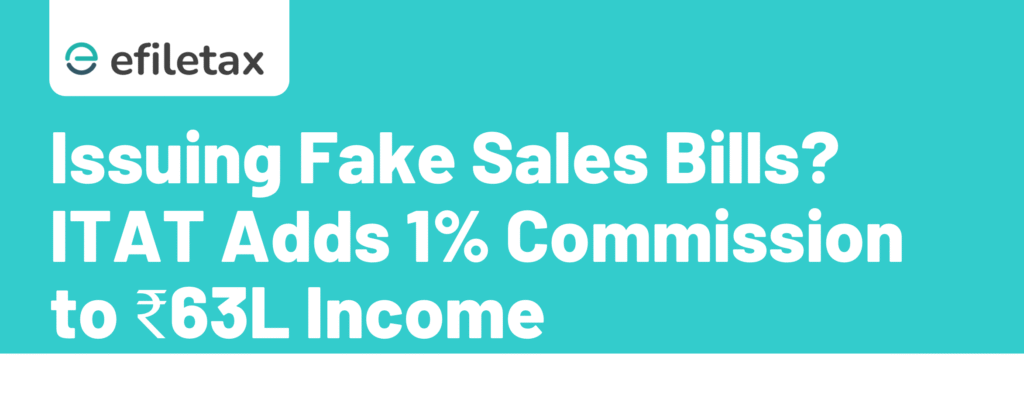
Introduction
When bogus sales bills are issued, tax authorities often add a 1% commission to declared income. In a recent case, the Income Tax Appellate Tribunal (ITAT) upheld this addition due to the assessee’s failure to provide a reasonable explanation. Let’s break down what this means for taxpayers and consultants.
Background of the Case
- The assessee issued sales bills worth ₹63 lakh.
- The Assessing Officer suspected these bills were bogus.
- As per standard practice, a 1% commission was added to income as unexplained income.
- The assessee failed to prove the genuineness of these transactions.
Key ITAT Observation
- The assessee did not provide:
- Evidence of actual movement of goods.
- Counterparty confirmations.
- Valid books to back the sales.
✅ Therefore, the ITAT confirmed the addition of the 1% commission.
Why 1% Commission is Added
- Based on common practice and past case laws, tax authorities assume:
- Issuer earns a small percentage as commission for providing bogus bills.
- This percentage typically ranges from 0.5% to 2%.
- It discourages misuse of fake invoices for reducing taxable profits.
Relevant Legal References
- Section 69C of the Income Tax Act, 1961: Unexplained expenditure can be added to income.
- SC & HC Rulings: Multiple judgments uphold addition based on probability if the taxpayer fails to rebut evidence.
- CBDT Circulars: Stress on tackling fake billing and tax evasion.
See official CBDT guidelines here.
Practical Tip for Taxpayers
✔️ Always maintain proper records:
Invoices, delivery challans, payment proofs, and confirmations from customers help counter any bogus bill allegations.
✔️ Seek professional advice:
Consult your CA if you receive a notice questioning the genuineness of your sales bills.
Impact on Business Owners
| Aspect | What Happens |
|---|---|
| Tax Liability | Increased due to addition of commission income. |
| Penalties | Possible penalty under Section 271(1)(c) for concealment. |
| Reputation | Risk of being marked as a habitual fake bill issuer. |
Related Efiletax Resource
👉 How to Handle Income Tax Scrutiny for Fake Invoices — Read Here
FAQs
Q1. Is 1% commission addition mandatory?
No, the percentage may vary case by case, but 1% is common.
Q2. Can I appeal an addition order?
Yes, you can appeal before CIT(A) and ITAT with supporting evidence.
Q3. How to avoid such issues?
Keep transparent records and avoid dealing with suspicious parties.
Summary
Issuing bogus sales bills? Be ready for 1% commission addition to your income. ITAT confirms this if no valid proof is provided. Maintain proper records to avoid tax complications.
Closing
Facing scrutiny for bogus sales bills? Get expert help from Efiletax to respond to notices, prepare robust replies, and ensure compliance. Contact us today to safeguard your business!